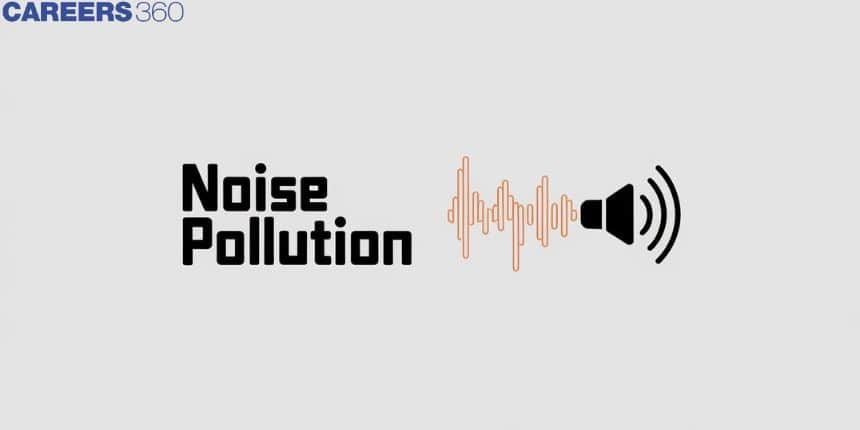Noise Pollution - Prevention, Definition, Types, Causes, FAQs
Imagine when you try to study for your exams and you are hearing continuous loud sounds from the neighborhood or people trying to sleep with traffic noise. These scenarios show noise pollution, which can be defined as any unwanted and excessive sound particularly that interferes with the lives of human beings and animals. They are usually emitted by automobiles, machinery, loud alleys, loud- loudspeakers, and firecrackers. Many serious effects are associated with type of noise pollution that can impact on physical and mental health. Therefore it is necessary to control the loudness of sound. Let's study in-depth about Noise Pollution.
This Story also Contains
- What is Noise Pollution?
- Types of Noise Pollution
- Causes of Noise Pollution
- Effects of Noise pollution on Human Health
- Prevention of Noise Pollution

What is Noise Pollution?
Noise pollution refers to the unwanted excessive sound that is present in the environment and can cause disturbance and harm to humans and animals. Noise is unpleasant and unwelcome, which causes discomfort in people. Vehicles, aircraft, industrial machines, loudspeakers, and crackers are a few of the significant sources of Noise Pollution.
The unit of sound is the decibel (dB), which measures the intensity or loudness of sound.
Types of Noise Pollution
The two categories of pollution are as follows:
- Transport Noise Pollution
- Industrial Noise Pollution
- Natural Noise Pollution
- Recreational Noise Pollution
Transport Noise Pollution
Sources of Transport noise pollution are:
- Road Traffic: Cars, motorcycles, buses, and trucks.
- Air Traffic: Aircraft noise from takeoffs, landings, and flights.
- Rail Traffic: Noise from train engines, whistles, and track friction.
- Maritime Traffic: Ships, particularly in ports, generate noise.
Effects of Transport noise pollution are:
It can lead to sleep disturbance, an increase in stress, and can also lead to Cardiovascular issues
Industrial Noise Pollution
Sources of Industrial Noise Pollution are:
Machinery sounds from Factories power plants, refineries, and mining, are the major sources of Industrial Noise Pollution.
Effects of Industrial Noise Pollution are:
- Hearing damage for workers.
- Stress and disturbance in nearby residential areas.
Natural Noise Pollution
Sources of natural noise pollution are:
Naturally occurring events like- Thunderstorms, earthquakes, volcanic eruptions, strong winds, waterfalls, and ocean waves.
Effects of natural noise pollution are:
Temporarily disturbing the lifecycle of humans and wildlife
Recreational Noise Pollution
Sources of recreational noise pollution are:
It can caused by entertainment and time off activities like: Fireworks, concerts, sports events, nightclubs, and bars.
Effects of recreational noise pollution are:
Repeated exposure can cause hearing damage and temporary disruption in the surroundings.
Also read -
Causes of Noise Pollution
The causes of noise pollution are as follows:
- Industrialization has resulted in an increase in noise pollution due to the usage of heavy machinery such as generators, mills, and massive exhaust fans.
- Vehicles: The second source of noise pollution is an increase in the number of vehicles on the road.
- Public events and celebrations can often lead to excessive noise pollution.
- Noise from trains, airplanes, and ships is a major contributor to noise pollution.
- Continuous constructions and similar activities create high-decibel sounds.
Effects of Noise pollution on Human Health
Noise pollution can be harmful to people's health in several ways:
- Hypertension is a direct outcome of noise pollution, which is caused by high blood pressure for an extended period of time.
- Constant exposure of human ears to loud noises that exceed the range of sound that human ears.
- Noise pollution disrupts sleep patterns, causing discomfort and an uneasy mental state.
- Cardiovascular concerns: Heart-related issues such as blood pressure, stress, and cardiovascular disorders can occur in healthy people, and people with any of these conditions may experience a rapid increase in their level.
- Chronic noise exposure is linked to anxiety, depression, and irritability, which can affect mental health.

Prevention of Noise Pollution
The following points outline some noise pollution prevention strategies, which help in controlling noise pollution.
- Horn sound in public locations such as schools, hospitals, and other places should be prohibited.
- Appropriate soundproofing measures should be built in commercial, hospital, and industrial facilities.
- The sound of musical instruments should be kept to a minimum.
- Noise pollution can be reduced by having a dense canopy of trees.
- In a forest, mountainous, and mining areas, explosives should not be utilized.
- Separating residential areas from industrial zones and highways.
Frequently Asked Questions (FAQs)
In general, there are two types of noise pollution: industrial and non-industrial. Noise from diverse industries and large machinery operating at a fast speed and with a high noise intensity are examples of industrial sources.
Congestion in train stations. Household noises include televisions, stereos, computers, vacuum cleaners, fans, and coolers, as well as washing machines, dishwashers, and lawnmowers. Fireworks, firecrackers, loudspeakers, and other loudspeaker-related events Explosions, shooting, and other forms of warfare cause noise pollution.
Noise pollution is commonly generated inside many industrial facilities and some other workplaces, but it also comes from the highway, railway, and aeroplane traffic and from outdoor construction activities.
Noise Filtering Techniques:
As much as possible, turn off notifications.
Decide to only check some things (such as Facebook, Twitter, and Instagram) once a day.
Delete any accounts or programs that aren't providing you with true value (I deleted my Facebook account years ago).
Noise released by modes of transportation, road traffic, rail traffic, air traffic, and industrial activity is defined as the undesirable or detrimental outdoor sound created by human activity.
